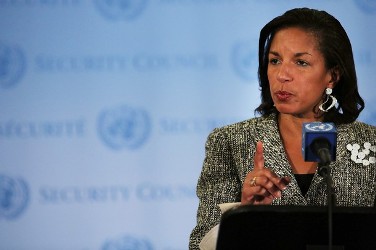No new deadline for Sudan and South Sudan but pressure to continue, US
August 9, 2012 (WASHINGTON) — UN Security Council will not fix a new deadline to the Sudan and South Sudan talks in Addis Ababa over their unresolved issues relating the the letters independence last year, nonetheless the talks cannot last for months, said US diplomat Susan Rice.

The two parties returned to the negotiating table in June following a resolution adopted on 2 May by UN Security Council demanding them to conclude a comprehensive and lasting deal on the outstanding issues. The Council also threatened to impose economic sanctions if they fail to strike an agreement within three months.
Rice welcomed the agreement the two parties concluded on oil transportation fees and described it as “an important and encouraging step”. She also praised the deal that Sudanese government and Sudan People’s Liberation Movement North (SPLM-N) signed on the humanitarian assistance to the rebel held areas of South Kordofan and Blue Nile.
However, she strongly urged the two parties to reach a comprehensive agreement over all the outstanding issues including border demarcation and Abyei. She stressed these are “binding obligations” as the resolution 2046 was adopted under Chapter VII of the UN Charter.
The US diplomat denied that there will be a new deadline stressing that “the purpose of the deadline is not for its own sake. It is to spur the parties towards resolving comprehensively the key issues that need to be resolved.”
Rice further underlined the urgency for the two parties to move quickly and to sign a deal on all the pending issues
“This Council is reviewing the issue, as you know, every two weeks. The African Union is very much focused on the urgency of this, and together we intend to hold the parties feet to the fire”, she went on to say.
The oil deal, as such represents a little progress in the complicated process between the two countries. But it is believed by the mediation and the international community to be the start of positive developments in the talks which are dominated by suspicion and mistrust.
The two negotiating teams are expected to meet during the last week of this month to resume talks over the pending issues particularly the implementation of security arrangements.
The African Union peace and security Council (AUPSC) reiterated in its meeting of 3 August that the proposed map for the buffer zone does not intend to demarcate the common border, refusing Sudan’s demand to withdraw the contested ‘Mile 14’ area from the security map.
Also a summit gathering presidents Omer Al-Bashir and Salva Kiir is to be organised by the mediation next September “to conclude a Final and Comprehensive Agreement between the two countries, including the way forward with regard to determining the final status of the Abyei Area;” the AUPSC said.
On the process between Sudan and SPLM-N rebels, Rice stressed on the “great urgency” to implement the deal they signed with the parties of the tripartite initiative over the humanitarian access to the rebel controlled areas.
In Khartoum, the Sudanese government on Thursday said it received the lists of proposed members of the UN and Arab League teams to participate in the humanitarian operation in Blue Nile and South Kordofan.
The African Union is the third party to participate in the tripartite humanitarian plan.
Sudan’s Humanitarian Aid Commissioner, Suleiman Abdel Rahman Suleiman, told reporters Thursday that they intend to reaffirm Sudan’s sovereignty and to control the whole operation.
He pointed out that the period agreed by the parties to reach the needy civilians in the rebel areas is three months started on 5 August and should be terminated on 8 November 2012.
But he pointed out the parties can reconsider this period if there are new developments in the political talks.
The government was refusing to allow aid groups to work in the SPLM-N areas saying the rebels will seize the food dedicated to the civilians in these areas. The African Union and the Arab League are supposed to provides monitors to ensure that only civilians benefit from the aid.
(ST)
